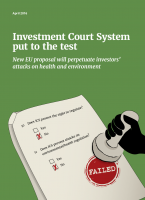TTIP leaks confirm civil society concerns
248 pages of leaked documents confirm concerns: In a misguided effort to conclude one of the most ambitious trade deals ever, negotiators are arguing away hard-won health, workplace, food, farming and environmental safeguards, while pushing power further from electorates, citizens and regulators, and deeper into the hands of businesses, corporations and interest groups.

Marten van Dijl

Marten van Dijl
Leaked documents from the TTIP (Transatlantic Trade and Investment Partnership) trade talks confirm dangers to health, environment and safety standards. The documents are from the twelfth round of negotiations in February 2016 (the thirteenth round concluded in New York on April 29th). For the Transnational Institute, the leaked documents support long held opposition to the proposed trade deal, which would see power shift further to corporate interests. The leak also points to the need to abandon an outdated model of negotiating behind closed doors, with business interests heavily involved and draft texts kept secret from public scrutiny.
The Guardian's initial report on the documents pointed to aggressive US negotiating tactics, and attempts to undermine the EU's environmental, health and social safeguards. The leaked documents suggest the US pushed for measures that would loosen EU regulatory standards. US proposals include efforts to oblige the EU to open its regulatory processes to input from American industries.
Concerns about potential impacts on food safety standards have plagued TTIP since its inception, notably in discussions of Genetically Modified (GM) organisms. The EU applies a precautionary approach to GM goods. Where the EU regulates to protect the public from potential harms, the US seeks to manage rather than avoid risk.
Greenpeace said in a statement that the US negotiators' demands would require the EU to break its climate change pledges. Similarly, efforts to reduce greenhouse gas emissions or work towards climate justice are notably lacking in these documents.
Efforts to subsidise or prioritise the development of local areas, such as grants for schools or industries, could be jeopardised by the government procurement measures described in the text. If governments act in the local interest and conflicts arise with trade partners, the dispute could be handled under a deeply anti-democratic Investor State Dispute Settlement mechanism rather than a local or national court.
The highly controversial Investor State Dispute Settlement mechanism (and its successor the Investment Court System), has proven particularly thorny. There is no leaked consolidated text on investment protection, indicating that there has been no advancement in the negotiations since last November. So far, it seems the US has not agreed to the idea of an Investment Court System as proposed by the EU.
The TTIP negotiations have already proven deeply unpopular, with hundreds of thousands demonstrating against the deal in recent months.
“It seems impossible to me that any standard will escape being lowered at some point in the future,” German constitutional judge Peter-Tobias Stoll told the Süddeutsche Zeitung “I am, frankly, quite surprised to see how adamant the U.S. is in anchoring American regulatory procedures in the TTIP agreement.”
The 248 pages of leaked documents confirm the concerns long held by many: In a misguided effort to conclude one of the most ambitious trade deals ever, governing some 40% of global GDP, negotiators are arguing away hard-won health, workplace, food, farming and environmental safeguards, while pushing power further from electorates, citizens and regulators, and deeper into the hands of businesses, corporations and interest groups.



